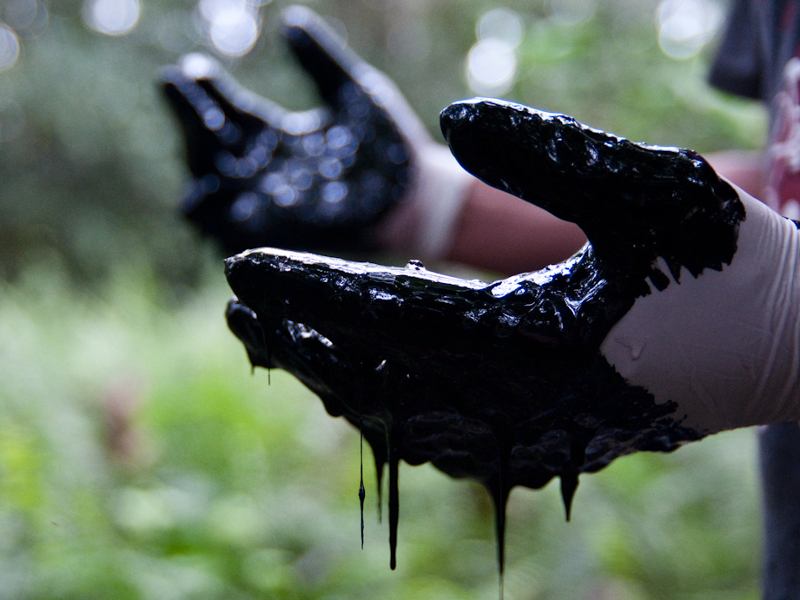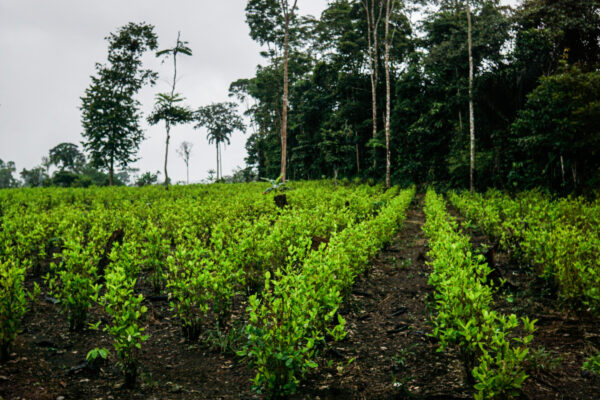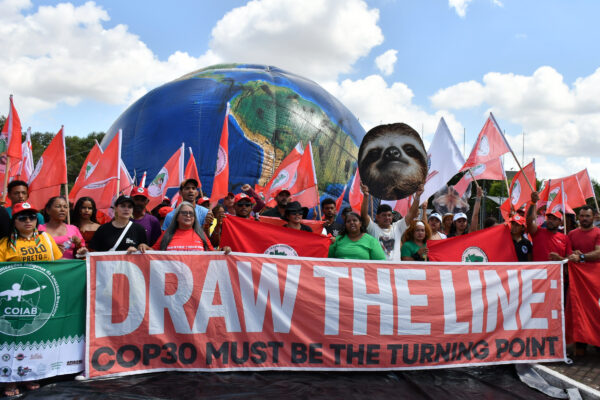
Ecuador is gearing up for a drilling frenzy. OPEC’s smallest member country is preparing to put new rainforest oil concessions up for bid, opened the first of some 200 planned new wells in Yasuní National Park, and signed oil contracts that overlap pristine Amazonian rainforest and indigenous territory. Ecuador is desperate to drill because it owes China billions as part of loan deals between the two countries that have Ecuador handing over much of its oil to China through 2024. The oil price crash has also exacerbated the issue, forcing Ecuador to deliver more crude than ever in order to pay back the debt.
Sound like a bad deal? It is. But not for everyone.
Earlier this month, El Universo broke a story on one of the many oil deals between Ecuador’s troubled state-run oil company Petroecuador and PetroChina, exposing a thriving culture of corruption that is lining the pockets of oil executives, middlemen, and government officials. Petroecuador obtained a $1 billion dollar loan from PetroChina in exchange for 69.12 million barrels of crude, delivering 2.88 million barrels per month at 7.25% interest.
According to documents revealed from Mossack Fonseca, the law firm at the center of the Panama Papers, Ecuadorian businessmen Enrique Cadena and Jaime Baquerizo, acting as intermediaries, managed to skim $1 off the top of every barrel of oil sold, earning a handsome $70 million “commission.” The international oil traders who bought the crude from China could then re-sell it on the open market at a markup. Shell companies and offshore accounts were used to hide the paper trail and the money. Most oil contracts prohibit resale for this reason, but there are no clauses in the deals between Ecuador and China that explicitly disallow it.
The agreements – where Ecuador pays China in oil for loans and access to credit – have allowed insiders like Cadena and Baquerizo to take millions off the top by underselling the crude and laundering it through offshore accounts, while both countries turn a blind eye, apparently hoping some of it returns in the form of kickbacks and bribes to grease the wheels for other lucrative projects. The traders who ultimately bought the crude are denying any relationship with Cadena and Baquerizo, despite documents from the Panama Papers showing the money trail.
The loans have also been the savior of President Rafael Correa who, after defaulting on Brady Bonds in 2008, found the country cut off from traditional lending sources. China quickly became Ecuador’s largest creditor, having provided eleven loans totaling some $15 billion since 2010. They kept him popular and in power, bankrolling the largest expansion of public sector spending in Ecuador’s history. But when the short-term loans at high interest rates come due, Ecuador needs oil to pay.
And if it can’t? Article 15 of a 2010 deal has what Analytica Investments calls a “waiver of sovereign immunity” that allows China to seize many of Ecuador’s assets if the country fails to repay the loans, appearing to only exclude items like Ecuador’s military, cultural heritage, embassies, and archives.
The country is reeling from government shutdowns and shortages due to low oil prices, and a recent 7.8 magnitude earthquake that devastated cities along the Pacific Coast. By giving barrels of oil to China in loan payments instead of selling them on the open market, Ecuador, which is on the US dollar system, is increasingly desperate for cash. Ecuador’s Bolivarian neighbor Venezuela is in a similar bind, despite having the world’s largest oil reserves.
This shady deal underscores how the loan agreements (the details of which are deemed state secrets by Presidential decree) have trapped Ecuador while institutionalized graft has become a driving force of the economy that is flourishing in a vacuum of transparency or accountability. The Petroecuador officials involved in this scandal were originally investigated for their role by the Ecuadorian Attorney General’s office, but they were later cleared.
Kickbacks Galore
It turns out that Baquerizo is an old pro at playing middleman, much to his own benefit. He was implicated in a major kickback scandal in April that led to a prison sentence for Alex Bravo, the head of Petroecuador for granting tens of millions of dollars in no-bid inflated contracts to Baquerizo for work on the company’s Esmeraldas refinery. He hid those kickbacks in offshore accounts. Carlos Pareja, Ecuador’s Minister of Hydrocarbons also resigned in May after it was revealed that he granted Baquerizo a $17.53 million contract for a job that was valued at $9.32 million.
According to Kevin Hall, one of the journalists who broke the Panama Papers, “the entire business class of Guayaquil in Ecuador” has offshore accounts. Economists have estimated that 8% of the world’s wealth is in offshore accounts, and they are particularly popular amongst the Ecuadorian political and economic elite. The Panama Papers also revealed that Ecuador’s Attorney General and former Central Bank president, the disgraced cousin of Ecuadorian president Rafael Correa, used offshore accounts to buy houses and properties.
Chinagate
And this is not the first time issues of corruption and the role of Chinese offshore accounts have surfaced. In 2014, the former chairman of state-run Chinese National Petroleum Company (CNPC) and the publicly listed PetroChina was sentenced to sixteen years in prison for corruption. Jiang Jiemen was involved in several major projects in Ecuador. As part of the investigation, the Chinese government sent a team of investigators to Ecuador, chilling relations between countries and slowing joint projects.
In April, the Panama Papers revealed that multiple Chinese state-owned enterprises operating in Ecuador have offshore accounts. While not illegal in and of themselves, offshore accounts are often used to hide illegal activity and to evade taxes. Andes Petroleum, the Chinese state-owned oil company that just signed a controversial oil deal for over half-a-million acres of indigenous territory in the Amazon, has offshore accounts in Barbados and the Virgin Islands. Ecuacorriente, the Chinese state-owned company that is expanding the mining frontier into indigenous territory in southern Ecuador, is also implicated. And the Ecuadorian subsidiary of China International Water and Electric – a company with over $600 million in public contracts – was raided by Ecuador’s Attorney General and internal revenue service.
Whether via blatant graft or government sanctioned skimming, connected elites like Cadena and Baquerizo are thriving. Corruption schemes like this one have become an industry unto themselves. The China-Ecuador loan deals have created a climate of corruption on all sides, which could boomerang back at Beijing. For Ecuador, its people and places like Yasuní National Park are paying the price for shortsighted policies and politics that have the country mortgaging its future.













